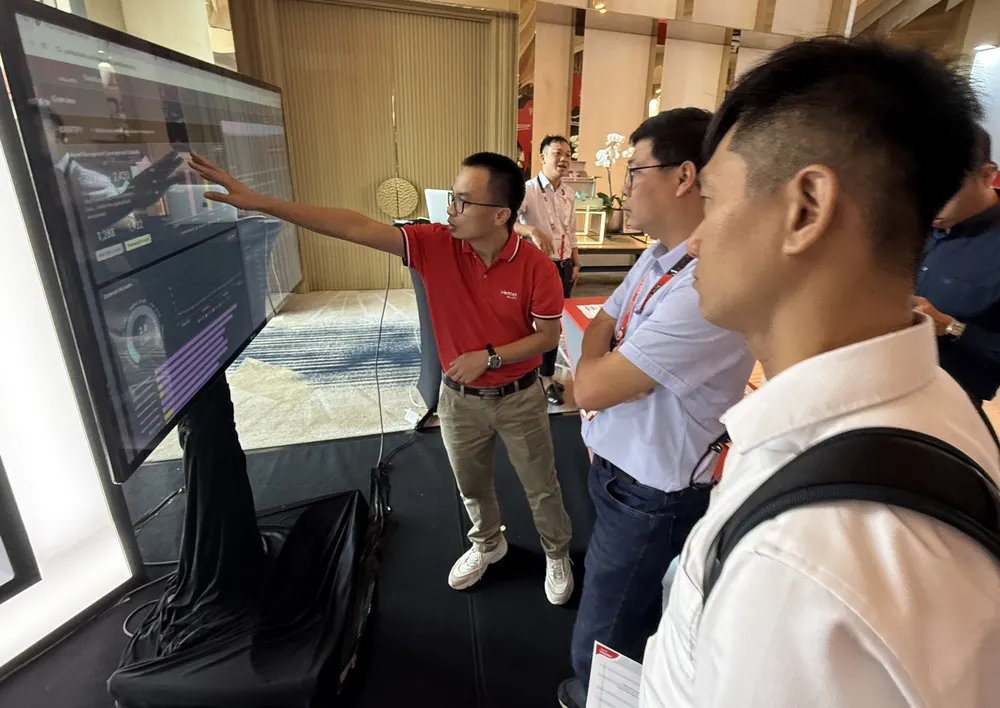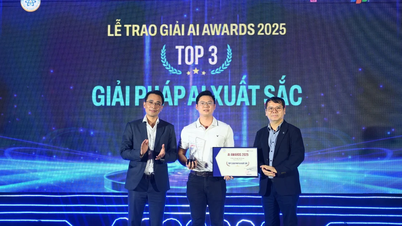Targeting financial data
Mr. Nguyen Son Hai, Director of Viettel Cyber Security, informed: AI helps predict, detect and respond to incidents faster and more accurately, but at the same time, it is also exploited by cybercriminals as a "new weapon". According to data from Viettel Threat Intelligence, in the first 6 months of 2025 alone, Vietnam recorded more than 8.5 million stolen accounts, nearly 530,000 distributed denial of service (DDoS) attacks and 191 data leaks, with more than 3 billion records affected, 3 times more than the same period in 2024.
Notably, the emergence of many forms of AI-based attacks, from personalized phishing emails, deepfakes that mimic facial images to malware that can mutate itself, poses many challenges to traditional defense systems.

A clear trend is that as digital financial transactions grow and expand globally, cybercriminals have quickly shifted their attacks to mobile devices and cryptocurrencies. Kaspersky's report on cyber threats in the financial industry published at the end of April 2025, the number of users facing banking malware on mobile devices has increased 3.6 times compared to 2023, while the number of cryptocurrency scams has also recorded an increase of 83.4%.
With the “hijacked” data, cybercriminals continue to lure users to visit fake websites that mimic the interfaces of famous brands and financial institutions. The banking sector has become the most targeted in financial fraud cases, accounting for 42.6% of all cases, compared to 38.5% in 2023.
Olga Svistunova, senior web content analyst at Kaspersky, said: “We predict that financial fraud will become increasingly personalized and targeted, focusing on exploiting vulnerabilities in everyday technology usage habits, which requires users to be more vigilant and take comprehensive precautions.
“Data security needs to be viewed from many angles, as recently many cases show that cybercriminal organizations often sell financial-related data. Most recently, a data file including credit payments, risk analysis... was sold by the hacker group ShinyHunters for 175,000 USD. Information on transaction history, debt history, credit rating, account balance... in the above-mentioned data block for sale can also be exploited by bad guys to commit fraud,” Mr. Nguyen Hong Phuc, Chief Science Officer of Conductify AI Company, noted.
Warning from quantum computing technology
With the current technological developments, the Asia-Pacific region (APAC) is considered a “fertile land” for the development of quantum computing technology (an advanced information processing method in the future when using complex calculations in a short period of time performed by many of the fastest supercomputers in the world - PV) and this also affects data security.
Many experts agree: This change in quantum computing technology lies in its “two-sided” ability, which is both an opportunity and a challenge. Quantum computers can break many current encryption methods, raising serious concerns about cybersecurity. On the other hand, this technology also reshapes the way we secure digital information in the future.
According to Sergey Lozhkin, Head of Kaspersky’s Asia-Pacific and Middle East, Türkiye and Africa Research Center, the quantum computing market in the Asia-Pacific region is on a strong growth path. It is forecasted that from 392.1 million USD in 2024, the market will reach 1.78 billion USD in 2032. This is an interesting but worrying development because quantum computing is the next “front line” of cybersecurity because it can bring breakthrough innovations but will also enter a new era of cybersecurity threats.
Quantum computers can be used to compromise traditional encryption methods that protect data in countless digital systems today, thereby posing a direct threat to regional and global cybersecurity infrastructure. Threats include the intrusion and decryption of sensitive information as well as the ability to decrypt in real time that quantum computers can perform much faster than other computers, making confidential data or private communications no longer secure, becoming easy to monitor and exploit.
“In the future, it is predicted that “quantum-resistant” ransomware will be designed to resist decryption, making it virtually impossible for victims to recover their data without paying the ransom. Therefore, security decisions today will shape the sustainability of digital infrastructure for decades to come. Governments, businesses and infrastructure providers need to act immediately to adapt, or face irreparable vulnerabilities later,” emphasized Mr. Sergey Lozhkin.
Security experts believe that not only individual users should always upgrade their data security capabilities according to the recommendations of authorities, but also units should quickly shift from passive to active defense thinking. One of the solutions emphasized is to convert the traditional SOC system to the CNADR (Cloud-Native AI-Driven Response) model, in which AI plays a central role in optimizing operations, risk management, and protecting data, digital infrastructure, etc.
Source: https://www.sggp.org.vn/phat-trien-cua-ai-va-may-tinh-luong-tu-dinh-hinh-tam-nhin-trong-bao-mat-du-lieu-post814559.html


![[Photo] General Secretary To Lam attends the ceremony to celebrate the 80th anniversary of the post and telecommunications sector and the 66th anniversary of the science and technology sector.](https://vphoto.vietnam.vn/thumb/1200x675/vietnam/resource/IMAGE/2025/9/29/8e86b39b8fe44121a2b14a031f4cef46)
![[Photo] Many streets in Hanoi were flooded due to the effects of storm Bualoi](https://vphoto.vietnam.vn/thumb/1200x675/vietnam/resource/IMAGE/2025/9/29/18b658aa0fa2495c927ade4bbe0096df)
![[Photo] General Secretary To Lam chairs the meeting of the Central Steering Committee on preventing and combating corruption, waste and negativity](https://vphoto.vietnam.vn/thumb/1200x675/vietnam/resource/IMAGE/2025/9/29/fb2a8712315d4213a16322588c57b975)
![[Photo] National Assembly Chairman Tran Thanh Man chairs the 8th Conference of full-time National Assembly deputies](https://vphoto.vietnam.vn/thumb/1200x675/vietnam/resource/IMAGE/2025/9/29/2c21459bc38d44ffaacd679ab9a0477c)
![[Photo] General Secretary To Lam receives US Ambassador to Vietnam Marc Knapper](https://vphoto.vietnam.vn/thumb/1200x675/vietnam/resource/IMAGE/2025/9/29/c8fd0761aa184da7814aee57d87c49b3)































































































Comment (0)